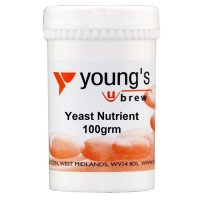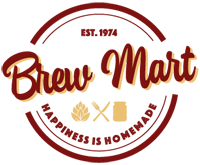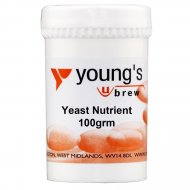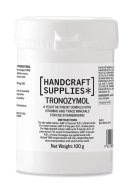Sign up to the Brew Mart newsletter for the latest news, offers & more
Please note that Brew Mart will be closed on Saturday, 5th July, AND Saturday, 12th July. Thank you.

Yeast Nutrients
Buy Yeast nutrients for wine home brewing for aiding the development of yeast during fermentation.
Most yeast nutrients are all purpose nutrients for wines or beers. However there are a few specialist nutrients, for instance vitamin B1 is specifically for use with flower wines. Nutrients give yeast a balanced diet, which in turn helps the yeasts produce better wines and beers.
WHAT IS YEAST NUTRIENT? AND HOW TO USE IT
What Yeast Nutrient is available in beer or winemaking?
Nitrogen-based yeast nutrients are usually added to a beer or wine before fermentation, though they may also help resolve stuck fermentations. The typical dosage for beer is 1 tsp per three gallons.
When should I add Yeast Nutrient to beer or wine?
When should I add yeast nutrients to my brew? You should add Yeast Nutrient at the start of fermentation.
Can I make Yeast nutrients at home?
Most Brewing and Distilling shops sell Yeast Nutrient mixes, and these are the best and most convenient to use. You can improvise your nutrients. Improvising means you need to add about 500g of Raisins per 4lt fermentation to get usable nutrients.
What is usable as a substitute for Yeast Nutrient?
- Orange or lime peel.
- Lemon juice.
- A cup of strong black tea.
- A cup of chopped raisins.
- Grape nuts boiled in water, then strained and the liquid added to the must.
- Bread yeast is boiled in water for 15 minutes to kill it.
If you have been brewing for any time, you may have heard of yeast nutrients. It is a ubiquitous additive for many wine recipes but rarely in beer recipes.
Several yeast companies produce their brand of yeast nutrients, but what exactly is it, and when should you use yeast nutrients.
Brew Mart will cover what yeast nutrients are and why you need them.
Yeast Nutrients
The health of the yeast is an important consideration when making homebrew beer, wine, cider or mead.
After all, it is the main reason for alcohol production. Yeast is necessary for converting sugars to alcohol, but it is also imperative because it has a significant influence on the flavour of the finished beverage.
Yeast produces many different compounds when fermenting a beer or wine, significantly affecting the flavour.
Wheat beer yeast, for instance, produces clove, banana and bubblegum like flavours, which is desirable for the most part, but if they are not healthy, they can have undesirable flavours.
Undesirable flavours to your homebrew from unhealthy yeast can contribute to tastes such as harsh alcohol flavours or buttery flavours from diacetyl or apple flavours from acetaldehyde. These are all symptoms of insufficient yeast cells or poor yeast health.
Yeast Nutrients is an aid to the Health Of Yeast Cells.
When making beer, wine, cider or mead, add yeast nutrients to ensure that the building blocks required by the yeast are present.
When yeast reproduces, they require nitrogen, amino acids, vitamins and fatty acids to produce new cells. If these components are not present when you add yeast to your wort or must, it can lead to problems at the start or during fermentation.
What Is In Yeast Nutrient?
Most blends of yeast nutrients contain a few different compounds; however, it is good to check the label to see what is in the mixture. Some yeast nutrients may only provide one thing, such as nitrogen.
The most common ingredient found in yeast nutrients is Diammonium Phosphate.
Diammonium Phosphate is a salt that provides a source of free amino nitrogen (FAN). FAN is an ingredient in many yeast nutrient blends, and it is vital for yeast health. Malt has a large amount of FAN when making beer, so this nutrient is often not needed.
Yeast Hulls: These are essentially dead yeast that acts as a source of lipids and fatty acids vital in providing new yeast cell production resources.
Vitamins, Thiamin and Biotin: Yeast requires specific vitamins for cell growth and reproduction. These vitamins are added to nutrient blends to provide these critical ingredients. When making country wine, Biotin, a B-vitamin, is recommended.
Magnesium, Zinc: These ingredients are added to yeast nutrients to increase the cell count and magnesium aids yeast metabolism.
Do You Need To Use Yeast Nutrients?
Brew Mart always recommends using yeast nutrients if the recipe has them listed in the ingredients and sometimes even if it isn’t. There are a few examples where it is unnecessary, so let’s explore these.
Is Yeast Nutrient Required In Beer Making
When making beer, it does have a lot of the nutrition yeast needs. When producing a wort for beer, you create it with nutrient-rich ingredients like malted barley. Using malted barley means adding yeast nutrients is not necessary.
When you are brewing particular beers, there may be certain instances that adding yeast nutrients will be beneficial. The time to think about using yeast nutrients would be in some of the following cases:
When Beer Is A Particularly High Gravity Beer:
Each yeast strain has a certain tolerance for alcohol. Depending on the type you use, you may get closer to this tolerance, making it more challenging for the yeast. Adding yeast nutrients in beers over 8% ABV will help ensure the fermentation will not run into problems causing yeast stress and stalling.
If Beer Production Uses A High Portion of Adjuncts:
If the beer uses many adjuncts, particularly if a sizeable fermentable product comes from plain sugar. Sugar alone has no natural nutrients for the yeast, so in cases where 25% or more of the fermentable materials come from adjuncts, yeast nutrients may be a good idea.
Unless you are brewing a beer like this, using a yeast nutrient for beer making is unnecessary. Most wort is nutrient-rich and will contain everything needed to produce healthy yeast.
Nutrients for Yeast Starters
If you regularly make yeast starters, you may consider yeast nutrients. Increasing yeast cell numbers is intensive and requires plenty of nutrition to create new cells. Using a yeast nutrient with vitamins, nitrogen, zinc, and magnesium is very beneficial to aid the process and speed it up.
Yeast Nutrients For Wine, Mead & Cider Making
Yeast nutrients become more vital for home winemakers and mead makers where the ingredients aren’t as nutrient-dense as malted barley and wheat.
When making country wines where more than 90% of the fermentable sugars come from simple sugars, the yeast needs yeast nutrients to reproduce and thrive. The same is valid for making mead. Honey is a simple sugar and will require a boost of nutrients for the yeast to ferment at its best.
Brew Mart would recommend using yeast nutrients when making cider, wine, and mead in most instances. The homebrewer has no way of knowing what nitrogen is available in the ingredients they are using or what other micronutrients may be present. A home test is unavailable to test these things. In contrast, beer makers have malt specifications to ensure something like FAN.
How Much Yeast Nutrient To Use?
Dosages of yeast nutrients are available on the package they come in, so always follow the advice and recommendations from the manufacturer.
It will be around 1 gram per litre or 1 tsp for five litres/1 gallons in most cases.
You usually add yeast nutrients in one go at the start of fermentation. Some more advanced winemakers space out additions of yeast nutrients into 2 or 3 stages, one before fermentation and another once fermentation has started. Brew Mart would say this isn’t necessary for a simple country wine, but this could be beneficial if you make grape wine in large amounts.















